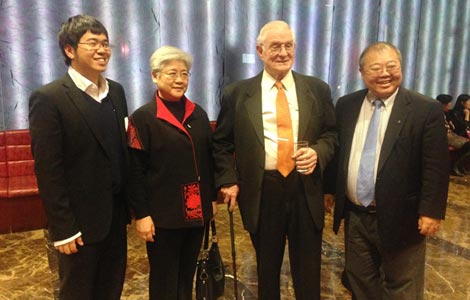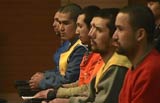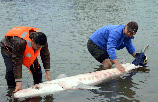Relocated parents face hard lessons
Updated: 2014-12-17 07:12
By Zhao Xinying(China Daily)
|
||||||||
 |
As young Chinese children head abroad to study, many anxious parents are opting to move with them, but some experts say the trend is a double-edged sword, as Zhao Xinying reports.
Tang Xiaobing hasn't seen her 14-year-old son since March when she left him in the United States and traveled back to China alone. Now, the 45-year-old Beijing resident faces the prospect of another eight months of separation-and all because she tried to do the right thing.When her son began studying at a high school in the state of Connecticut in June 2013, Tang became one of a growing number of Chinese parents who move abroad and take up residence close to their offspring. Despite speaking little English and fully aware that she would see little of her son, and would even have to e-mail the school to arrange meetings with him, Tang traveled to the US in March 2013 to find a place to live.
When the boy started at the new school, she went with him. "I couldn't let my son go by himself because he had never been apart from me during the past 14 years. Even though we wouldn't see each other often, I hoped that he would feel, 'Ah, Mom isn't far away' whenever he thought about me," she said.
Now, though, she won't be able to visit the US again for at least a year because of visa issues, and the pain of separation grows stronger every day.
Tang's story is all too familiar to Li Peng, deputy general manager of Kentrexs Education Group, which arranges for young Chinese to study in the US. Li said that as an increasing number of students from well-to-do families head overseas at a young age to study, a growing army of parents, mostly mothers, are accompanying them.
Li's agency arranges for about 300 Chinese students to study overseas every year. "Of those, about one or two dozen parents express a willingness to accompany their children whatever the cost, and that number will keep on rising," he said.
However, Kentrexs doesn't encourage parents to move abroad and act as traveling companions, especially if the child is headed for the US.
"The education system in the US is mature, and young Chinese students will be asked to attend boarding schools or stay with host families. Whatever the circumstances, the children will be well-protected and supervised. As such, there's no need for parents to stay on, especially as they will seldom see their children even if they live in the same place," he said.
Despite the setbacks, Tang's only goal is to return to the US and be with her son. "I hope to go back as soon as possible and continue as his companion," she said.
Positions reversed
Wu Ping and her 15-year-old son, a ninth-grader at a high school, live in a rented house in New Haven, home of the famous Yale University.
At first, Wu seems no different to any other Chinese mother overseas, but her story is very different. "In the first place, rather than me coming here to keep an eye on my son, he came here to keep an eye me while I recuperated after an illness," the 46-year-old Beijing native said.
Wu was diagnosed with breast cancer in 2010, but when her condition worsened in 2013, her husband-Lang Yongchun, main anchor of Xinwen Lianbo, or News Simulcast, one of China's most influential television programs-decided to send her overseas in the hope that a change of environment and mood would assist her recovery. However, as Lang was unable to be absent for long periods, the couple decided that their son would accompany Wu to the US.
At first, the boy lived with a host family, but now after 15 months, both mother and son have adapted well to life in the US, and Wu's health has improved so much that in September, her son moved into her rented home so she could look after him herself.
During her time in the US, Wu has made many friends, most of them Chinese parents in New Haven accompanying their children. The 20-strong group often meets to exchange experiences and stories about their children's education, and to offer a helping hand to anyone encountering difficulties.
"We've even hired an American teacher together, to teach us English-$30 an hour, two hours a week," Wu said.
The former magazine editor has also been writing a book about the US education system. "I hope to offer my opinions and experience to a larger number of Chinese parents because a growing number of young Chinese kids are coming to the US to study, and it's good to be prepared," she said.

 10 English-language apps to get around and about in China
10 English-language apps to get around and about in China
 Happy Christmas market
Happy Christmas market
 Top 10 secrets inside Xiaomi's marketing
Top 10 secrets inside Xiaomi's marketing
 Old fashioned tea house seen in Anhui
Old fashioned tea house seen in Anhui
 Yearender: Chinese actresses who married in 2014
Yearender: Chinese actresses who married in 2014
 Ground broken in NYC
Ground broken in NYC
 University students awarded C-100 scholarships
University students awarded C-100 scholarships
 'Early Mona Lisa' traced to English country home
'Early Mona Lisa' traced to English country home
Most Viewed
Editor's Picks

|

|

|

|

|

|
Today's Top News
Greenland Group starts NY housing project
Graft watchdog steps up SOE investigations
China's ex-PM donates $6m to foundation
HK losing its appeal as an IPO market
China-US trade talks get started in Chicago
Chinese liquor in deal with US firm
Chinese chess captivates fans
HK chief calls for respect of law as protests end
US Weekly

|

|







